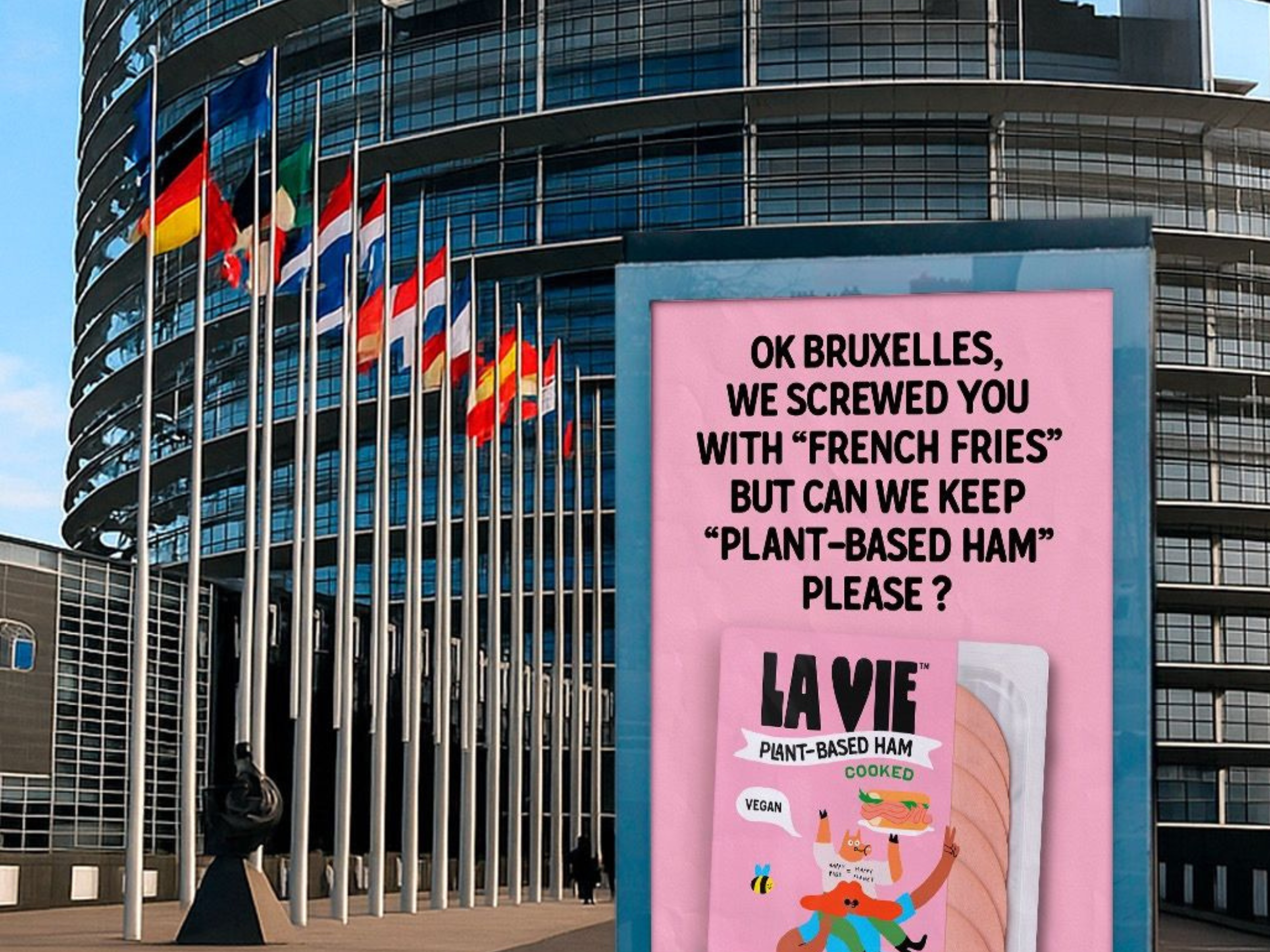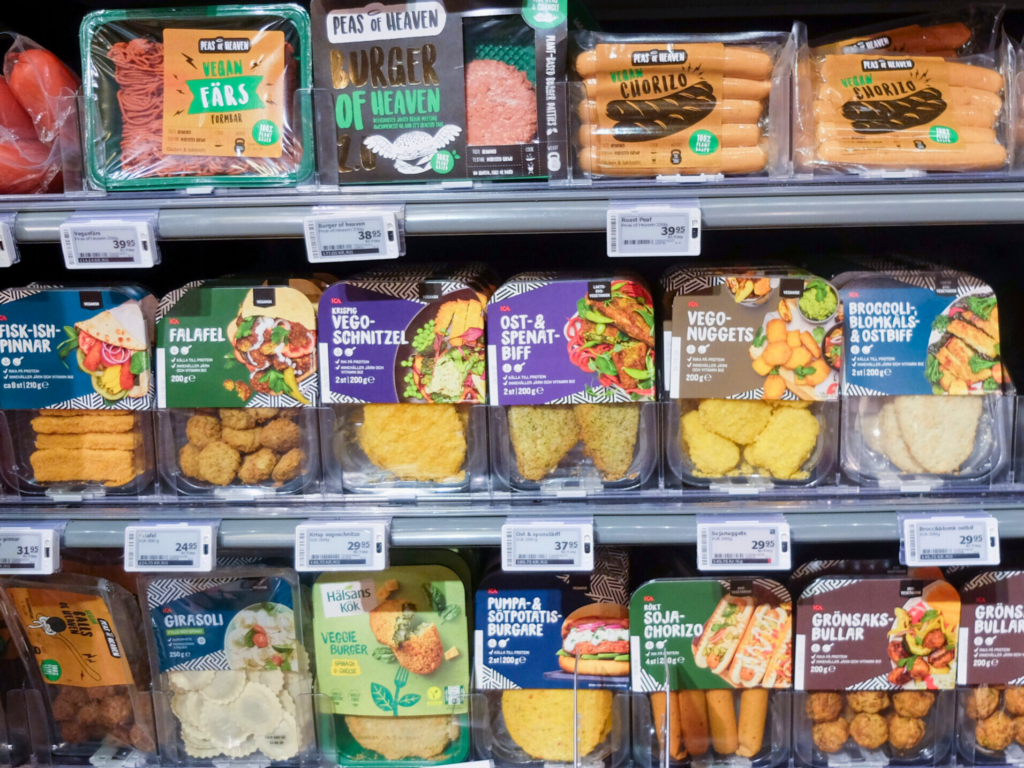
The EU Parliament today voted in favour of a ban on meat-like designations on plant-based meat product labels, paving the way for trilogue negotiations.
The conservative European Parliament has voted to ban terms like ‘beef’, ‘bacon’ and ‘egg white’ from the packaging labels of plant-based alternatives.
In the EU’s plenary session on Wednesday (October 8), MEPs adopted the amendment with 355 votes in favour, 247 against, and 30 abstentions.
The proposal was brought by French lawmaker Céline Imart, a Parliamentary rapporteur, in a review of the Common Market Organisation (CMO) regulation in July. It seeks to ban a wide range of terms, including ‘burger’, ‘sausage’ and ‘steak’, from being used to market plant-based alternatives.
Last month, the EU Parliament’s 49-member agriculture committee voted in favour of a ban, setting the stage for the plenary vote. Now, with the parliament’s backing, the proposal will now be discussed in interinstitutional negotiations between the EU Commission, Council and Parliament, where all 27 member states will decide whether it becomes law. Those discussions will start in the upcoming weeks and be finalised by the end of the year.
“Today’s vote by the European Parliament to restrict the labelling of plant-based foods is disappointing,” said Jasmijn de Boo, global CEO of ProVeg International.
“Europe is the biggest consumer market globally for plant-based meat alternatives, a market from which EU farmers will benefit hugely as it creates higher-value markets for pulses, soy, wheat, fungi, nuts, and vegetables – many of which are already grown in Europe.”
Rafael Pinto, senior policy manager at the European Vegetarian Union, added: “Banning words like burger or sausage for plant-based products is unnecessary and counterproductive. It undermines consumer freedom and sustainability while pretending to solve a problem that doesn’t exist.”
Consumers aren’t confused by plant-based meat labels

The labelling of plant-based meat has been up for debate for a decade in the EU, but there were signs that the discourse would come to an end last year, when the European Court of Justice (ECJ) ruled that no member state can prohibit companies from using these terms on vegan product labels.
That decision noted that such bans can be implemented only if a member state legally defines meat products and descriptive terms first (a lengthy and complex process), and even then, such a ban would only apply to products manufactured within that country. The only other option would be an EU-level ban, which is the goal of the new proposals.
One of the main reasons cited by supporters of the ban is that labelling meat-free products the same way as meat would cause confusion for EU citizens. However, a host of studies have debunked that idea.
In a large survey by the European Consumer Organisation in 2020, 80% of people said plant-based meat should be allowed to use such terms. And in the 2023 Smart Protein survey, only 9% of citizens from nine member states said they didn’t recognise plant-based meat alternatives.
In fact, in an opinion published last September, the ECJ’s advocate-general stated that the use of several different names resulting from such a ban could be more confusing for consumers.
“Aside from the fact that consumers are not confused by ‘meaty’ labelling of plant-based foods, we must also remember that the EU already has robust legislation in place to protect consumers from misleading labels,” said de Boo.
“By restricting plant-based labelling, the EU single market is also undermined as such restrictions introduce administrative complexity, especially given the diversity of culinary traditions and languages across member states.”
Policymakers, companies and even conservatives question the ban
During a debate in Strasbourg the day before the vote, Green MEP Anna Strolenberg slammed the proposal as a “waste of everybody’s time”.
“We could have spent this time debating the fact that our planet is on fire, the fact that we have a brutal war on our borders, and that our societies are getting angrier and more divided. And instead, when Europeans look at their leaders, what do they see? They see us discussing burgers,” she said.
Unlike plant-based meat products, Strolenberg did not mince her words. “The meat lobby is trying to weaken its innovative food competitors. It’s trying to weaken farmers – also livestock farmers – transitioning to more plant-based products. And my colleagues and EPP are happy to do the dirty work, instead of actually helping farmers,” she remarked.
“If you want to help farmers, give them stronger contracts. Give them a better income. Let’s help them innovate. Let’s give them the support they need to adapt to the climate crisis that is devastating their harvests. Our farmers are too important to be left in the past,” she said. “Stop talking about burgers and start working on the issues that matter.”
But it’s not just progressive lawmakers who questioned the proposal. According to AFP, the head of the centre-right EPP party (which Imart belongs to), Manfred Weber, told reporters this week: “People are not stupid, consumers are not stupid when they go to the supermarket and buy their products.”
The vote comes a week after more than 200 companies and organisations petitioned EU lawmakers to reject the Parliamentary ban, and permanently withdraw a similar proposal by the Commission too. The list of organisations backing the call has since grown to 400.
“We’re not giving up,” said Rob De Schutter, head of communications at climate coalition WePlanet. “We’ll keep working with partners across the EU to make sure common sense prevails and that sustainable plant-based meat alternatives are helped rather than harmed in Europe.”
The post EU Parliament Backs ‘Veggie Burger’ Labelling Ban on Plant-Based Meat appeared first on Green Queen.
This post was originally published on Green Queen.